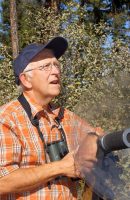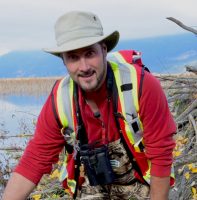Advanced Field Ornithology: Identification and Surveys by Sound and Recordings
- Start Date: June 03, 2019
- End Date: June 06, 2019
- Time: various - see schedule
- City: Revelstoke, BC
- Venue: Okanagan College (1401 1 St W, Revelstoke, BC, Rm 102) and local field sites
- Instructor: John G. Woods & Marc-André Beaucher
Course Description
For many field ornithology surveys, the ability to identify bird species by their calls and songs is an essential skill. It is also one of the hardest aspects of field work to master. Technological advances in sound capture and visualization are pushing the ornithological frontiers with tools that make it easier than ever to learn field-identification by sound and to survey natural soundscapes (and their birds). In addition, modern sound recordings are providing high-quality acoustical specimens for analysis and independent review.
This course will combine field-experience listening to bird calls and songs during three mornings at the height of the breeding season, with hands-on recording practice to generate sound files. Each afternoon, the class will learn to edit and review their recordings using sound visualization software on their personal laptop computers.
Topics for discussion and field practice will include: ethical considerations in recording bird sounds; digital recorders including smartphones, parabolas and digital video; the use of autonomous recording devices such as SWIFT; standard protocols for point counts (North American Breeding Bird Survey—BBS; BC Breeding Bird Atlas); and, the use of Audacity and Raven Lite 2.0 software to visualize songs and calls and to edit sound files into a format suitable for upload into eBird.
After taking this course students will have several tools and strategies to improve their ability to identify birds by songs and calls. They also will have an appreciation of the complexity and limitations of several forms of acoustical surveys.
Class size limited to 12 to allow for increased individual attention and coaching both in the field and during the laboratory sessions.
Course Schedule:
Mon June 3, 7-9pm, Okanagan College. (All students need to attend this evening session in order to be field ready for Tuesday morning)
Tues June 4, 5am-4:30pm
Wed June 5, 5am-4:30pm
Thurs June 6, 5am – 1pm
A course outline is available upon request. Email office@cmiae.org
Our Instructors
 John G. Woods, Ph.D. (UBC, Zoology)
John G. Woods, Ph.D. (UBC, Zoology)
Dr. Woods has been engaged in field research in British Columbia for more than 40 years. While his research has covered a wide range of taxa (birds, bats, bears, elk, ectoparasites) he has enjoyed observing birds throughout his career and is currently the eBird observation reviewer for the Cariboo-Chilcotin region. John also participates in the continent-wide Breeding Bird Survey as a principal observer for a census route in the Chilcotin. As regional coordinator for the BC Breeding Bird Atlas in the Chilcotin and North Columbia Mountains, he organized three packhorse expeditions to study little-known alpine areas in the Itcha and Ilgachuz mountains. For many years, John held an active Master Bird Bander permit and helped to establish two bird-banding stations in BC. Since 2012, John has taught several 10-day credit courses (3rd year Biology) in field ornithology for the University of BC at Kelowna (2012, 2014-17) and an introductory course to field ornithology for the Columbia Mountains Institute of Applied Biology at Creston in 2017. John particularly enjoys sharing his fascination for field biology and has led numerous field trips focussed on bird research.
 Marc-André Beaucher, M.Sc., RPBio
Marc-André Beaucher, M.Sc., RPBio
Marc-Andre is the Head of Conservation Programs at Creston Valley Wildlife Management Area(CVWMA). He has volunteered and worked at CVWMA for nearly 20 years and has extensive experience with the identification of wetland birds in the Creston Valley. He started birdwatching at the age of 13 and continues to maintain a passion for the conservation of birds and their habitat. Marc-Andre is a trained wildlife biologist and enjoys spending time in the field monitoring and/or surveying amphibians, birds (of course!), reptiles, and invertebrates, (e.g. dragonflies and butterflies) …as well as plants. He regularly takes people and groups on field trips out in the wetland and especially loves getting people impassioned about wildlife through hands-on experiences.
Who should attend?
- Field technicians and biologists with some experience in field identification of birds who would like to increase their skills in surveying by sound
- Biologists and managers responsible for managing field ornithology projects
- Biologists in other fields wishing to diversify their areas of expertise
Preparation and what to bring
- Students will receive a short reading assignment and eBird exercise a month before the course begins, this will take less than 30 minutes to complete
Required equipment:
- Laptop computer with Audacity and Raven Lite 2.0 (both available free online) installed and tested
- Smartphone (either iPhone or Android)
- Binoculars of good quality (magnification 7-8.5, objective lens 32-42 mm, waterproof, several loaner binoculars may be available, contact the instructor if you need more information or would like to borrow binoculars)
- Appropriate field clothing for any weather conditions (full rain-suit, hat, hiking boots, appropriate layers, expect rain and cold and hope for better weather!)
- Day-pack
- water bottle and any food you would like to have (email will be sent to all registrants with catering details to help with your planning.)
Optional equipment:
- Digital cameras (you can use these to record sound with or without HD video)
- Smartphone bird identification app including song samples (recommendations will be sent to registrants before the course)
What is Included in the Course?
- A Rite in the Rain all-weather field NOTEBOOK No. 146 will be supplied to each student.
- Spotting scopes and tripods will be supplied for group use, but please bring your own if you have one.
- A variety of digital recorders and microphones will be available to try using in the field.
- Students will provide their own transportation but will likely be able to car-pool with others during the field sessions
- Food: A break with coffee and a light breakfast will be provided each morning at 9:30 at the field location. There will be an opportunity to order bagged lunches and snacks. Refreshments will be provided for the classroom portions of this course.
Thank you to our host:
The Columbia Mountains Institute would like to give a big THANK YOU to our event host for accommodating us during this course: Okanagan College – Revelstoke Centre


